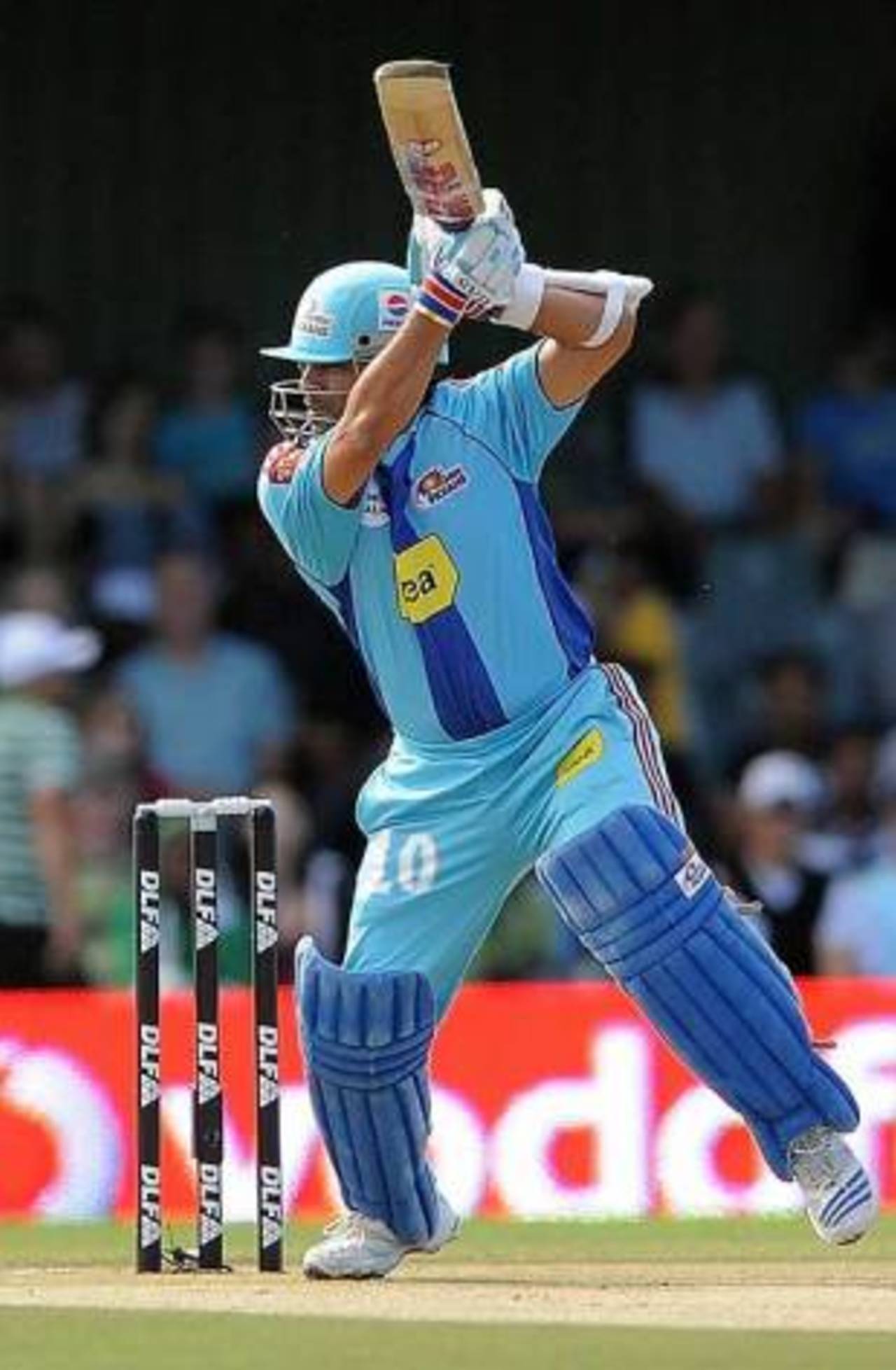All hail the old guns
Kallis and Tendulkar have shown that classical virtues still have a place in the IPL
Harsha Bhogle
19-Mar-2010

There's still room for the high left elbow in Twenty20 - though no one knows for how much longer • AFP
Like writers of classical prose getting on to Twitter, Sachin Tendulkar and Jacques Kallis are lighting up this year's IPL. They still compose sentences, have time for a stylish adjective, and can still fit their thoughts into 140 characters. Dey dnt hv 2 rush der shots,hv gr8 timing & hit de gaps. (I'm sure someone can better that!)
It was fascinating watching Tendulkar bat against the Delhi Daredevils. A crisp cover drive off Dirk Nannes was classically struck, and when Farveez Maharoof bowled the slower one, he advanced as close to the pitch of the ball as possible and with a flick of the wrist played it along the ground through midwicket. Occasionally, only occasionally, he made a concession to new-age batting by trying to slog the young legspinner Sarabjit Ladda but in doing so, actually showed why he didn't need to. He made 63 from 32 balls, and you came away thinking you had seen a painting, not splotches of colour thrown randomly onto a canvas.
He was followed by young Saurabh Tiwary, one of our new-age cricketers who frequently make a mockery of boundary ropes (sometimes the groundsman is forced to as well). He is a big-built man, with broad shoulders, and only occasionally makes a concession to the nudged single; doesn't worry too much about searching for gaps in the field, for his idea of an opportunity is the space above the fielder, not between him and the next guy. Admittedly he batted after the field restrictions had gone off, but his style brought 61 from 37 balls. It was like being at a music festival where Manna Dey and heavy metal were on the same stage.
Meanwhile Kallis was adapting too. He played himself in during the fantastic run-chase against the Kings XI (45 from 38 chasing 204?) and when the time came exploded, but stylishly (next 44 from 17). Again, he was able to do that because Manish Pandey and Robin Uthappa were hitting the drums on turbo while he was plucking the strings, but he showed it is possible to retain the elements of orthodox batting and still make the strike rate look very acceptable.
The ICC needs to be careful not to go the way of Indian airports, where certain people are allowed to circumvent security requirements. Young Stuart Broad needs to realise that he can be pulled up if he commits the same offence as others
Both Tendulkar and Kallis probably need to open the batting, but they are demonstrating that you do not need to alter your favoured bat speed to score runs. Both batsmen have their game built on precision; the bat comes down at a certain time to be able to hit the ball at a certain spot, the body is ideally positioned for that event. When they try to slog (or when anyone is, for that matter) the bat comes down faster, the head goes out of sync, it looks like a bad dance step. To be honest, I don't know how much longer the game will allow the classicists, but what we do know is that such players can be survivors too. Three cheers to that.
The first week has also shown that you cannot really determine how many runs can be scored in the last few overs. Eighty are getting scored routinely in the last six against bowlers who haven't exactly grown up playing for Yellow House v Green House at school. The most obvious reason is that pitches and outfields and boundary lines are stacked in favour of batsmen, and that you are allowed to lose 10 wickets in 20 overs. But I think there is more to it. Like computer technology opened our eyes to new speeds and storage capacities, I think batsmen are also discovering that things are possible that they hadn't been aware of.
For bowlers to go down a similar path (and they have already begun), they need a bit of help. In the last few days I have had the opportunity to have a quick chat with Daljit Singh, the curator at Mohali, and Venkat Sundaram at Delhi, and I put the same question to both of them. For one game, I asked, why can't you prepare a pitch with some zing in it, where the keeper can feel the ball thudding into his gloves, where the crease becomes what it always was - a safe haven not to be transgressed. For a brief moment their eyes lit up; then they shook their heads.
Meanwhile the ICC needs to be careful not to go the way of Indian airports, where certain people are allowed to circumvent security requirements. Young Stuart Broad needs to realise that he can be pulled up if he commits the same offence as others. It will do him good in the long run but it will also do good to the ICC's credibility.
Harsha Bhogle is a commentator, television presenter and writer. He is on the IPL commentary team